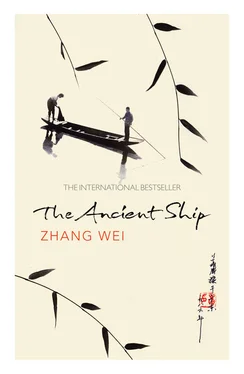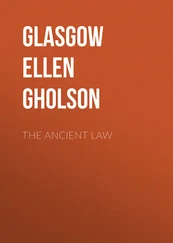Just before the sun went down, an urgent signal sounded in the mountains. Heavy artillery continued to send sound waves through the air. Thrushes sang in the bamboo grove, as before. The autumn winds had blown to the east of the mountains the day before; today they were blowing back. Night had fallen, immersing everything in its inky darkness.
The sky darkened until Baopu could not see a thing. The thrushes’ songs grew indistinct in the darkness of night. Now the mournful strains of a flute alone held sway.
The young man from the Sui clan who was now sleeping for eternity could hear the flute being played on the bank of the Luqing River, and his soul would follow the familiar tune all the way back to Wali.
After letting his hands fall away from his face, Baopu looked at the people around him. Technician Li of the survey team and Li Zhichang were silent; Baopu’s uncle lay on the straw, dead drunk. Suddenly he began shouting shrilly, but no one could understand a word, though the cadence was of a seagoing melody.
Li Zhichang turned to Technician Li and said hoarsely, “Wouldn’t it be wonderful if there were no more wars? That way people could devote themselves to the study of science.”
Technician Li shook his head. “War is inevitable. The world has never known total peace. A good time is any time people aren’t fighting a world war.”
“Do you think one of those will break out any time in the next few years?” Li Zhichang asked.
Technician Li smiled. “That’s something you’ll have to ask those running the show, the higher up the ladder the better. But there isn’t a person alive who’s willing to give you a guarantee one way or the other. My uncle is a military expert, and I’m always looking for a chance to get him into a debate. It’s great fun. One of our favorite topics is what they call ‘Star Wars.’ ”
Baopu, who was listening in on the conversation, was reminded of the nickname people in town had given Technician Li: Crackpot.
“Last time you went too fast,” Li Zhichang said. “I’d like to know more about those Star Wars. You were saying something about a NATO and a Warsaw Pact. What’s that all about? I mean, like they’re a couple of persimmons, one softer than the other…”
The laborer standing beside Crackpot laughed, but Crackpot cut him off. “I don’t know which persimmon is softer, but those are military blocs. NATO is led by the United States; the Soviet Union leads the Warsaw Pact.”
“I’ve got that,” Li Zhichang said.
Crackpot continued, “If those two persimmons ever bang into one another, they’ll both be crushed. They are the key to whether or not there’ll be a world war. Both sides need to be careful not to cross the line. The year the Soviets shot down a South Korean airliner, America sent its army into Grenada. Then the Americans announced plans to place midrange missiles in Western Europe, so the Russians countered by upping the number of missiles siloed in Eastern Europe. They also broke off weapons talks on three occasions and boycotted the Olympics. It was tit for tat, with both sides digging in their heels, till they reached an impasse. Relations between the two countries were deteriorating rapidly, and the rest of the world looked on anxiously, detecting the smell of gunpowder in the air. The US and USSR faced off like that for more than a year before relaxing tensions a little. In the end the foreign ministers of the two countries sat down in Geneva and talked for more than seventeen goddamned hours…”
“Everything was ruined by people who knew nothing about water,” Sui Buzhao bellowed, his body twisting in the hay. “After Uncle Zheng He died, the goddamn ships, all eight or ten of them, sank, killing all those people. There were cracks in our hull and we tried to stop the leaks with our bare bodies. They didn’t trust the Classic of the Waterway, so they deserved to die, disregarding even the life of the helmsman. How the hell could it end well? I puked until there was nothing but bitter bile in my stomach, and the barnacles cut me bloody when I went down to stop up the leaks. I bled while reciting the Classic of the Waterway until I was hoarse. The ship sailed to Qiyang zhou, and as stated in the book, ‘You must fix your direction with care and make no mistakes in your calculation. The ship cannot veer. If it heaves to the west it will run aground, so you must heave east. If you heave too far to the east the water will be dark and clear, with many gulls and petrels. If you heave too far to the west, the water will be crystal clear, afloat with driftwood and many flying fish. If the ship is on the right course, the tails of birds will point the way. When the ship nears Wailuo, seven geng to the east will be Wanli Shitang, where there are low red rock formations. The water is shallow if you can see the side of the boat and you must be careful if you see rocks. From the fourth to the eighth month, the water flows southwest, and the currents are quite strong…’ But no one paid any attention. These men finally had to cry when the waves rose up around midnight. It was useless to cut the mast, for the current ripped the ship apart. I’ll curse them for the rest of my life because of what happened to that ship.”
“All arms races are fierce competitions,” Crackpot continued. “Tey start out on land or at sea, but that doesn’t hold their interest for long, so then it moves to outer space. When the Americans say they’re going to do something, they do it. They decided to put up their Strategic Defense Initiative in three stages: The tests would take them up to 1989, they’d finalize the design in the 1990s, and the program would be functional by the year 2000. Maybe earlier. Then they could shoot down any missile, no matter where it came from, using guided weapons with lasers or particle beams. At that point it would no longer be necessary to fight on land. Everything would be taken care of out in space. Space, the new frontier. The Star Wars initiative is part of what the Americans call advanced frontier strategy. The newspapers call it a multilayered deep-space defense system. If they’re allowed to actually succeed in this, the long-standing balance of power between the US and the USSR will no longer hold, and that will be a challenge to the whole world.”
Crackpot ignored Sui Buzhao’s shouts as he carried on a lively onesided conversation with Li Zhichang, who nodded and occasionally made a mark in the dirt with his finger, as if recording scientific data. “What I don’t understand,” he said, looking in the direction from which the notes of the flute carried over in the darkness, “is how the foreigners can spend all that money making enough atomic bombs for any contingency and still not be content.”
Crackpot slapped his knee. “The more A-bombs you have the less you have to be content about. That’s the whole point. Consider this: A few powerful countries have labored for years to produce nuclear weapons, more than they could ever use, and they could double their present arsenal, and it wouldn’t make any difference. There are so many of the things that no one dares to use a single one. Whether you launch the first attack or not, that’s the end for everyone. It’s a perfect example of the concept that when things reach an extreme they develop in the opposite direction. When the number of bombs reaches a certain point they can’t be used and have to lie sleeping in their silos for all time. But if the Americans’ Star Wars initiative becomes operational and can intercept the other guy’s missiles in space and keep them from hitting friendly targets, that changes everything, don’t you see?”
Li Zhichang murmured his understanding of what he was hearing but didn’t say anything. Then, as if awakening from a dream, he blurted out, “My god! If they can do that, what’ll happen to us?”
Читать дальше












